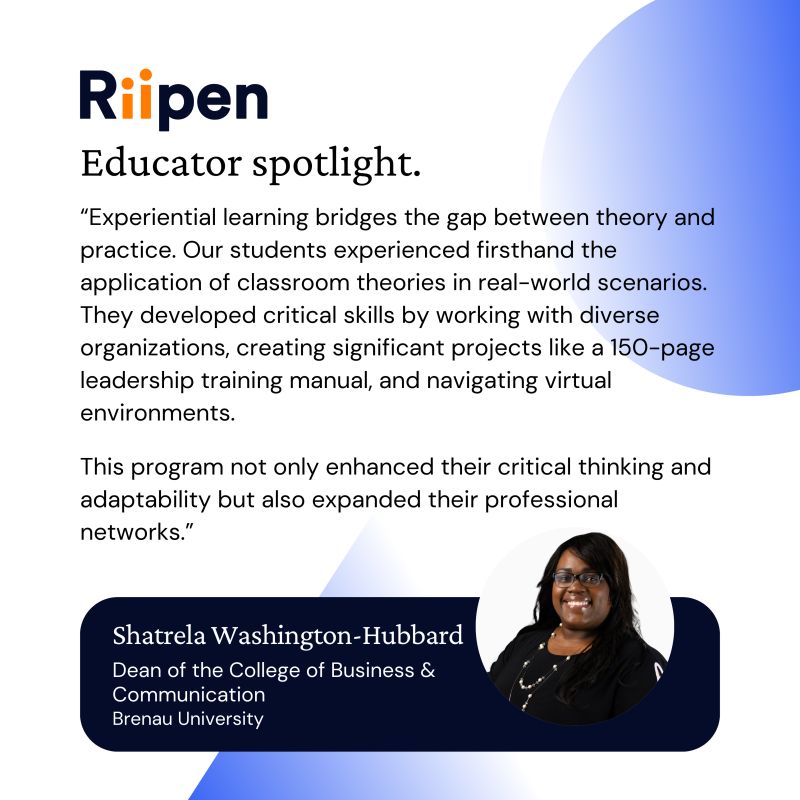Can I afford an internship? This is a question that many college and university students have to ask themselves. Internships and other work-based learning opportunities have been proven to help students prepare for the workforce and land their first job after graduation, but these experiences can be very exclusionary for students juggling full-time work or family commitments alongside their studies, as well as those lacking reliable transportation options. In August 2023, CIC launched the Work-Based Learning Consortium, a new program to integrate work-based learning into the curriculum and create more equitable internship and work-based learning opportunities for students at member institutions. Twenty-five (25) member institutions were selected to participate in the Consortium, in partnership with Riipen, an experiential learning platform and marketplace. The Work-Based Learning Consortium is made possible through the generous support of Strada Education Foundation and Ascendium Education Group.
In the fall semester of 2023, five faculty members at each institution received training from Riipen staff members on how to integrate a work-based learning component into their upper-level courses. These faculty champions built their courses on the Riipen platform and collaborated with employers around the globe to select real-world projects with practical outcomes that complement their subject matter and provide valuable skill-building to students. In the spring semester of 2024, 117 faculty members launched new courses that integrated a work-based learning component through Riipen’s platform, integrating 200 employer-led projects into the curriculum and serving 1,455 students. To support these faculty members and encourage collaboration across institutions, CIC hosts an online community of practice where participants can discuss their strategies and experiences with this new model of work-based learning. The community is facilitated by Shatrela Washington-Hubbard, Swinton A. Griffith III Dean of the College of Business and Communication at Brenau University (GA).

The 125 faculty champions come from a wide variety of disciplines and integrated the work-based learning component into upper-level courses in fields including communications and marketing, art history, public health, data analytics, and religious studies. The industries for the employer-led projects were equally diverse; students participated in projects focused on environmental sustainability, law and policy, social work, digital marketing, and beyond. As well as providing work-based learning opportunities to students in over 300 courses, the Work-Based Learning Consortium also includes a research component, led by Ithaka S+R, to assess the impact of the revised courses on students, faculty members, and employers, with particular interest in post-graduation employment outcomes. Ithaka S+R’s report from the first year of the Consortium showcases the experiences of faculty members and students thus far. Students relished the opportunity to dive into “real world” situations and contribute to projects that would have an impact outside of the classroom, and they recognized how these projects strengthened valuable workforce skills like communication and teamwork. Employers appreciated the opportunity to build relationships with colleges and universities and to benefit from the expertise of the students participating in their projects. Faculty members admitted that designing these new courses has been labor-intensive in the first year, but they also attested to the benefits of the Consortium on students’ learning and engagement in their courses.
The Work-Based Learning Consortium will run two more years of courses that integrate a work-based learning component through Riipen’s platform in 2025 and 2026. Each year, faculty champions will either design a new course or make improvements to their existing course based on student feedback and outcomes. A final report on the Consortium’s activities and the impact of this model of work-based learning at the 25 participating institutions will be shared in 2027.
Work-Based Learning Consortium Participating Institutions
(for Academic Year 2023–2024)
Albion College (MI)
Allegheny College (PA)
Alma College (MI)
Brenau University (GA)
Centenary College of Louisiana
Coe College (IA)
Concordia College (MN)
Drew University (NJ)
Elms College (MA)
Franklin University (OH)
Holy Cross College (IN)
Keuka College (NY)
Lane College (TN)
Lindenwood University (MO)
Mercy College (NY)
Morningside University (IA)
Nazareth University (NY)
Ohio Northern University
Point University (GA)
Roanoke College (VA)
St. Ambrose University (IA)
The College of Wooster (OH)
Viterbo University (WI)
Waynesburg University (PA)
Wingate University (NC)


